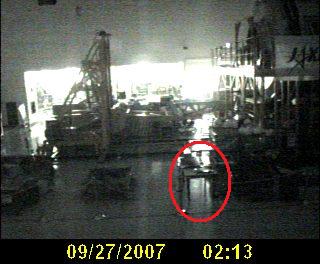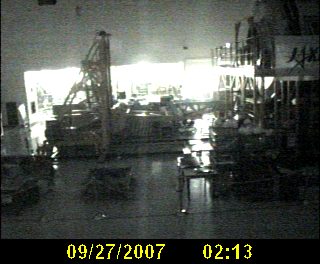
In my last posting I thought I had spotted a mobile launcher platform. But I was wrong. As a friend pointed out, it can not be. Look at the red circle – this is a table. It would be a real gigantic table, if it were a MLP. So it can’t be…
changed the blog url
Yesterday, I talked with some of my friends about the blog. They said: “hey, cool, but what do you do after 2010?”. I was stunned. But, yes there are right. In 2010, the space shuttle is retired. Some years later (hopefully sooner than later), the Ares rockets will launch cargo and humans into space, to the Moon, hopefully to Mars and at some distant time even beyond that.
When I started this blog, the main intension was to provide a trip report from my launch viewing. But it is also interesting to write about all the cool things that go together with launch preparations. So I may continue to drop a post or two on future missions. And, of course, I will try to view an Ares launch when it is time to do so (though I guess tickets to the first human flight will be very hard to get hold off).
Writing about Ares under shuttlelaunch.gerhards.net? No, that sounds strange. So I have changed the blog url to spacelaunch.gerhards.net, just to be prepared for the new things to come. And, hey, you never know if some friendly folks will sponsor me a trip to see an Ariane or Russian launch… ;)
I have set up a redirector to redirect traffic with the old urls to the new ones. In the first day, that may not work very well (due to technical issues, for the geeks: DNS propagation delay). I’d also appreciate if you could update your bookmarks. Sorry for any hassle this url change causes – but I think it has a good reason…
Is this a mobile launcher platform?

I found this picture on one of the NASA webcams. I wonder if it is a mobile launcher platform (MLP)? If so, is it the one to be used for Discovery? I do not know enough about VAB processing flow, but it might be that the full stack (orbiter, boosters, external tank) be assembled first. When this is done, they might be lowered to the mobile launcher platform. If that’s the case, then my speculation will probably be right. If anybody knows for sure, please drop me a comment. And, of course, I’ll also try to find out…
work log for 2007-09-26
work log for rsyslog:
2007-09-26
– applied patch provided by varmojfekoj to support building ommysql
in its own way (now also resides in a plugin subdirectory)
– fixed a bug in cvthname() that lead to message loss if part
of the source hostname would have been dropped
One Day of Contingency Recovered?

As I have read on the web, Discovery seems to have one more contingency day left in its launch schedule. The wizards in the VAB seem to have done real magic. Originally, the rollout to the pad was scheduled for Sunday. Now, it seems to be Saturday, September 29th at 8pm ED. Well, that’s maybe half a day of contingency if I think more about it. Extra contingency time is very desirable, because four days were lost when a damage on a landing gear strut was found and needed to be repaired. Even though the repair was ultra-fast, almost all remaining contingency time was used up. Now, with the excellent processing flow, NASA keeps again up with it. My hope is that some other activities will also be earlier than planned, leaving even more contingency. As we all know, spaceflight is inherently complex and there is a good chance that extra contingency (spare) time is needed at some stage.
For those interested: I assume that NASA TV carries some video footage from the VAB rollout.
Its very promising to see work progressing so well. To me, it looks more and more like the first launch attempt is indeed on the October, 23rd. Let’s hope for the best, including good weather. I’ll keep you updated.
News Source: http://www.raumfahrer.net/forum/cgi-bin/YaBB.pl?num=1173608035/480 (german!)
Picture: VAB rollout during the STS-83 mission (this is NOT STS-120!), Photo Credit: NASA
oops … did not notice comments…
Sorry to all folks who commented on my blog – I did not react at all. Shame over me. If you take time to provide your ideas, you deserve at least a little bit of reaction.
The problem is that I am an email junkie – I set mail notifications for everything I do. And if I don’t get an email notification, it is almost sure that I forget about it. And when setting up the blog, I forgot to enable email notifications. Guess what happened then…
The good new is that the notifications are now enabled, so I will now reply much more promptly. I enjoy your thoughts and discussions, so keep them coming. Maybe we can even manage to network a couple of folks who want to view this launch. Wouldn’t that be nice? So, if you are in for it – please spread word about my little blog and help get more cool people to read, comment and discuss :)
hotels, hotels, hotels…

Did I mention that I had quite some trouble booking hotel rooms for my shuttle launch? The nights in Orlando were no problem at all – Orlando simply has so many hotels of all kinds, it is really hard to book them out… But Titusville and Cocoa Beach is a different story.
I made the mistake to not immediately book hotel rooms after I booked my launch transportation tickets from KSC. When I was ready to do that, my fellow “launch viewers” already had taken the majority of rooms. Interestingly, the 22nd was most heavily booked – but the 23rd was much easier to get. It looks like a lot of folks believe in a total on-time launch – or hope to be able to extend if the launch is delayed. The later, I think, is a false impression.
I finally managed to book rooms, but I have to change hotels every now and then. The interesting fact about this is that on certain days I need to pack all my luggage into the car – and if that is on a launch day, I’ll need to drive with my fully-packed car up to KSC. I am not sure what the security guards will say about this… For now, I hope it will not really be necessary, but, if so, I hope I can get along with it. Of course, once I am down there in the Titusville area, I’ll check with the hotels if I can put my luggage into some room even when I have checked out.
So I was all set. Ahem – was I? Actually, I made a second mistake: I was so sure that Orlando hotels are no problem that I simply forgot to book a room over there! Boing… Crazy me. What now? Well, book ASAP. And that I did. Thankfully, I was able to book at the Residence Inn, what was exactly what I wanted. But the bad news was that pricing had changed. I suspect there is higher demand for rooms due to the shuttle launch. Whatever it was, it costs me around 20 bucks (plus tax, of course), per day. Bottom line: if you want to visit a shuttle launch and still stay in Orlando, book as early as possible even if it typically is no problem to get a nice room in the Orlando area…
Did not manage to release 1.19.8 today…
Sorry folks, I didn’t manage to release 1.19.8 today. There was simply too much other activity that required attention. So I couldn’t finally decide on how to distribute from now on. Anyhow, it is my firm intention to release 1.19.8 tomorrow.
The good news, though, is that some folks are already testing that code. Maybe I get some feedback until tomorrow morning – and maybe that even helps me to get a better release…
needed to pull 1.19.7 release
Unfortunately, there is a serious bug in rsyslog 1.19.7 that can prevent UDP message reception. Totally. No message received at all. This somehow slipped through our own testing as well as test at some third parties.
The root cause of this problem is interesting: I changed an internal interface to make things more reliable. What I changed had some old code in them that did return’s right in the middle of the code. I overlooked those returns and so an invalid state was returned.
The interesting fact is that the function now returns an enum type (rsRetVal). Previously, it returned an integer. For some reason, the compiler issued no warning when the old (accidentally remaining) code returned an integer. If I’d receive a “wrong type” warning, I’d probably spotted it before even doing testing at all.
Bottom line: what’s wrong with my compiler settings?
Oh, and yes: I’ll release the fixed version soon. It then will be 1.19.8 to avoid confusion. I now fight with the distribution system: I received a patch that allows ommysql to be build as a separate module. So now it is separate – even from a distribution point of view. That causes some grief for distributing it and can possibly break some things in distribution packages. I need to think how to tackle that in the best possible way…
worklog for 2007-09-25
2007-09-25
– changed ttyname() to ttyname_r() – not a real fix, as this part of the
code was single threaded, but better to be prepared for the future.
– changed localtime() to localtime_r()
– released 1.19.7
– applied contributed patch to improve repeated message processing
(see https://bugzilla.redhat.com/show_bug.cgi?id=303341)
